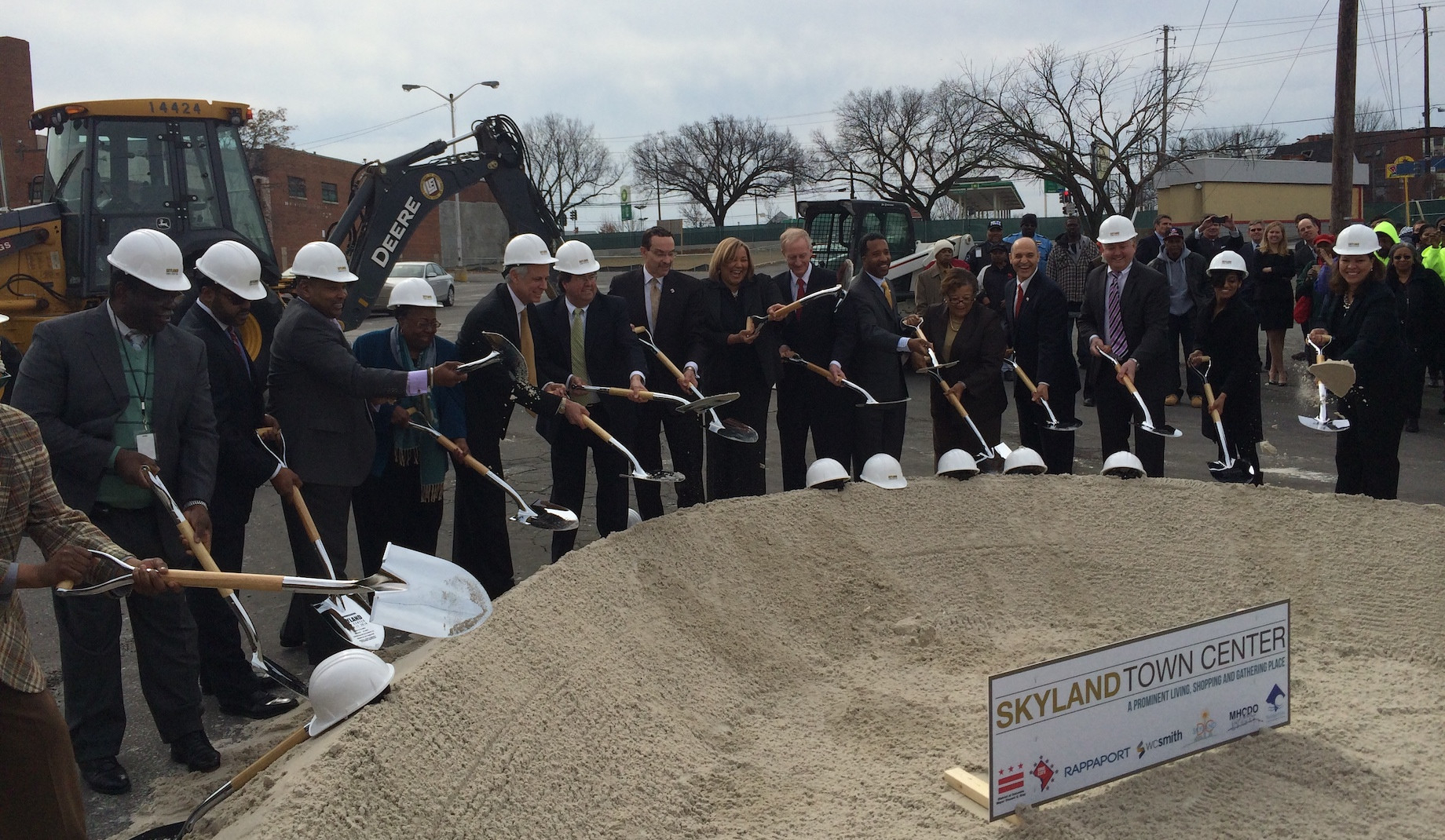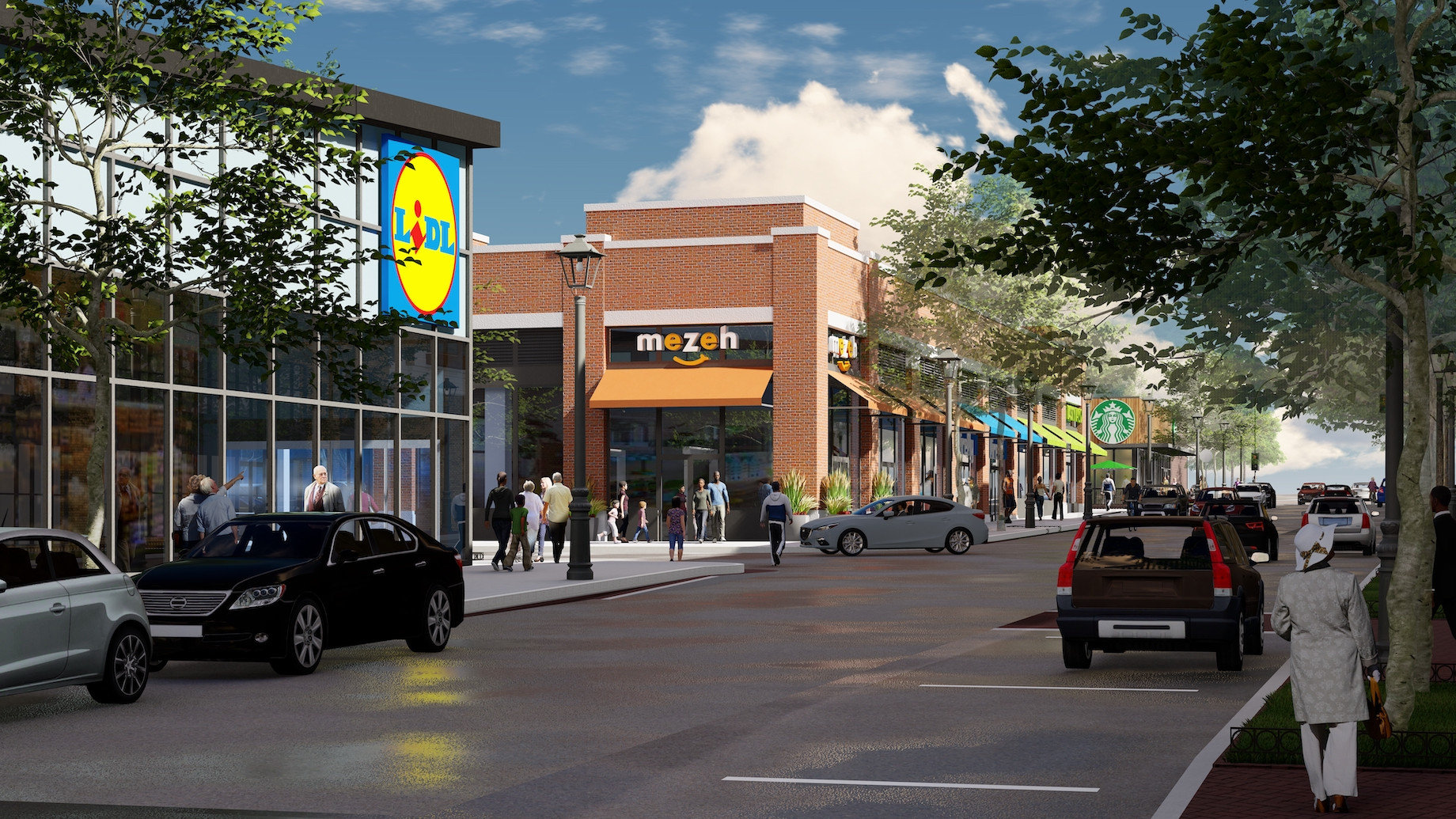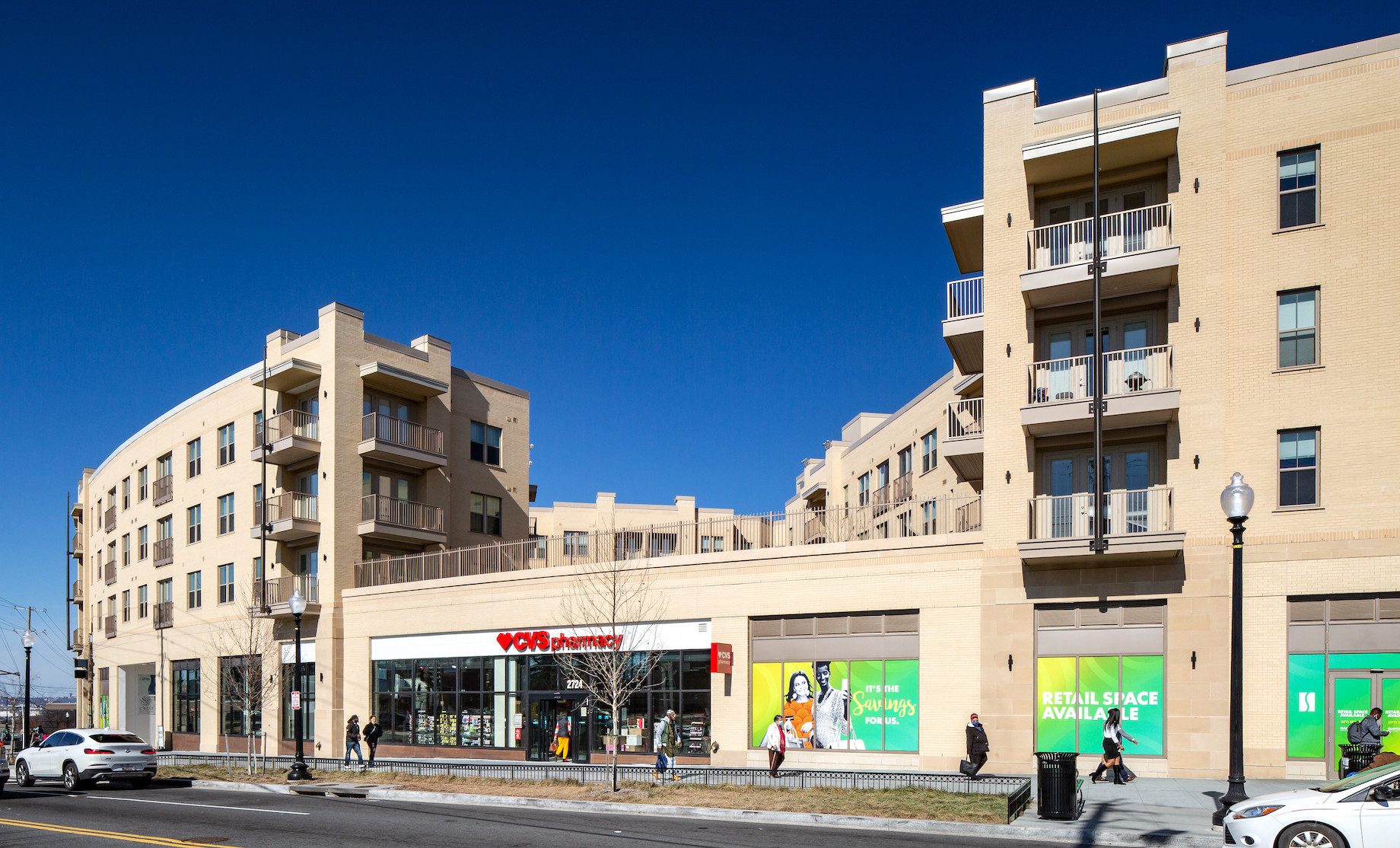By year’s end, local retail developer Rappaport will have delivered a grocery store, sit-down restaurants, residences and more to Washington, D.C.’s underserved Skyland neighborhood — two decades after CEO Gary Rappaport won a bid for a collective 40 parcels and set about to build a high-end suburban center. The project, now known as Skyland Town Center, took vision — from a singular retail developer who imagined what 40 separate parcels could do together but also from a developer that dug in to see what the community itself envisioned.
In May 2002, Gary Rappaport won a bid from the District of Columbia to acquire 17 acres occupying four square blocks in the district’s 7th and 8th wards. Individual landowners had been operating stores on each of the 40-some plots independently. Despite Rappaport’s winning bid, the project still faced an eminent domain battle that reached the Supreme Court as the district sought to declare the area condemned so it could be sold it to a private developer. That case was settled in 2014, and the site sold to Rappaport a year later.
Gary Rappaport estimates about 100 in-person meetings with local residents that solidified the development’s primary objective: the first new grocery story for Southeast D.C. in more than 10 years. Walmart would have filled that need but pulled out of plans to anchor Skyland in 2016. Three years later, Lidl stepped up to fill the gap with its first District of Columbia store. Mayor Muriel Bowser announced the lease in May 2019 at the annual ICSC conference in Las Vegas. The store broke ground in January and will open Sept. 28.

Lidl groundbreaking
Rappaport executive director of brokerage Bill Dickinson said the neighborhood is surrounded by well-maintained, older, post-war homes. “Those residents needed a place to shop, too,” he said in regards to groceries. “No longer would they have to make the drive over to Prince George’s County,” Maryland, outside the district. Also key to the pride of the community is Lidl’s surface parking, which is more appreciated than structured parking. Rappaport president Henry Fonvielle said the space Skyland had to offer a grocer is ideal for Lidl, whose stores are generally 30,000 square feet. This one will come in at 29,089. By comparison, Wegmans tends to run about 80,000 square feet, Giant and Safeway 55,000 to 65,000 square feet, Aldi 20,000 and Trader Joe’s 12,500.

Lidl’s first Washington, D.C., store, to be located in Skyland Town Center, is scheduled to open on Wednesday.
Second on longtime residents’ wish list for the area was sit-down restaurants, and deals to bring as many as three full-service restaurants are in the making, Dickinson said.
As Skyland Town Center came along over the years, its wants evolved, too. It determined it wanted a denser, mixed-use development, and housing also became a key element in the blueprints. So in 2007, Rappaport reached out to Chris Smith from well-established housing developer WC Smith. Smith knew how to “get deals done” in the district, Rappaport said. And like Rappaport, he had a long history of giving back to the community, often via his entrepreneurial spirit.
“The overarching challenge was aligning both the district and community interests with ours,” said WC Smith executive vice president Brad Fennell. “Every element from building design, site plan to type of housing needed to be ironed out, which took several years. A project without community and city backing would not have been viable to pursue.”
What resulted is the 263-unit Crest at Skyland Town Center. The property represents the first majority-market-rate apartment building constructed across the Anacostia River from the rest of the District of Columbia in more than 40 years. The building features a 24-hour concierge, a lounge, a fitness center, garage parking, a dog park and a pool. The units sit above 85,000 square feet of ground-floor retail. Three-fourths of the units are one-bedroom models, and the remaining are two-bedrooms. The leasing center opened in April 2021, and the residences are 80% occupied. WC Smith expects it to be fully leased by the end of this year.

Crest at Skyland Town Center answered the District of Columbia’s call to create mixed-use by adding 263 apartments at Skyland.
Fennell said Crest received a great deal of interest right away: “Renters in the submarket were excited to have the opportunity to move into a new building with market-rate amenities in a town center format. About a third of current residents resided east of the river, one-third are from the remaining parts of the metro area and one-third are transfers from out of state.” Teachers, government workers and service-based professionals make up a large portion of the demographic.
The Lidl grocery storea the coming restaurants and the Crest apartments all join retailers already open for convenient shopping, including CVS, Chase, a barber shop, a nail salon and fast-casual restaurants Roaming Rooster, & pizza, Tropical Smoothie Cafe, Maizal and Mezeh, plus the district’s only drive-thru Starbucks. Trek bikes also has opened its headquarters there, and Edenbridge Health has a facility. Two of the four square blocks of the project are complete, and the other two — one with rental homes and the other with rental homes, for-sale condominiums, for-sale townhomes or a combination — will deliver by 2026.
Public Input
To win the bid to acquire and develop Skyland, Rappaport was required to work with minority groups, and so Skyland has progressed with the help of the nonprofit Washington East Foundation, the nonprofit Marshall Heights Community Development Organization and for-profit home developer Harrison Malone Development, which helped build relationships in the area. Skyland also obtained tax increment financing and grants from the district.
Rappaport was determined to understand what changes residents needed and wanted most. With Washington East Foundation’s help, he estimates he made at least 100 face-to-face visits with residents in their homes, their churches, recreation centers and elsewhere in the neighborhood to understand their economic situations, lifestyles and dreams. He kept hearing that the community had a strong desire for better retail, including the additions of grocery and sit-down restaurants. Convenience and community pride were common themes. “From the start, we went after this deal because it fit into my beliefs that developers must focus not only on the needs of their retailers but on communities they serve,” Rappaport said. “A retail presence is the base of why people choose to live in an area or why they choose not to.”
“A retail presence is the base of why people choose to live in an area, or why they choose not to.”
The company’s effort was so determined that the Washington Business Journal created a Perseverance award in 2019. “This is the most important development and the one in which I’m most proud in my career,” said Rappaport, who owns and/or manages more than 70 retail properties in the Washington, D.C., metro area. That career includes a 2002-03 stint as ICSC chair. At that time, he made speeches to the ICSC membership about what developers could and should do to support underdeveloped urban areas and inner cities.
RELATED: You Can Make Money in Underserved Communities, Says Robin Zeigler
Fonvielle said Rappaport’s goal in every project is to become a part of the community: “We want residents in the area and visitors to the retail centers to feel a source of pride in their community. If the shopping centers are just sort of OK, well, then that means its customers just feel OK about their community. We give all of our real estate the Rappaport treatment, which means it gets continuous, attentive care and maintenance.”
WC Smith’s Fennell said: “We are very satisfied with what we have built so far at Skyland. Transforming an ill-conceived collection of neglected buildings into what it is today is extremely rewarding. Bringing new housing stock and a plethora of retail options to a community where these options are limited is very fulfilling.”
As developers are wont to do, Rappaport set up a trailer office near the property to encourage locals to apply for jobs at the stores there. It and W.C. Smith opened a workforce center to help locals with the job application process, and that workforce center has become a model for other developers looking to give back to their communities, much as Rappaport imagined for Skyland Center when he started it almost a generation ago.
By Paul Bergeron
Contributor, Commerce + Communities Today